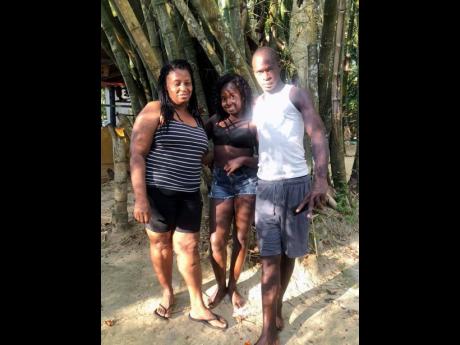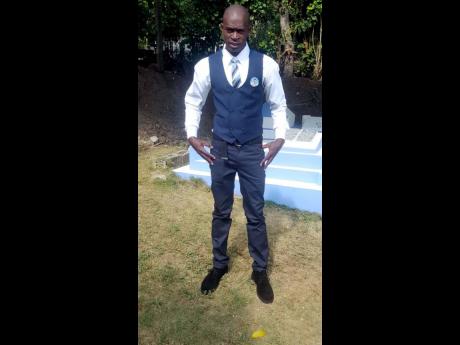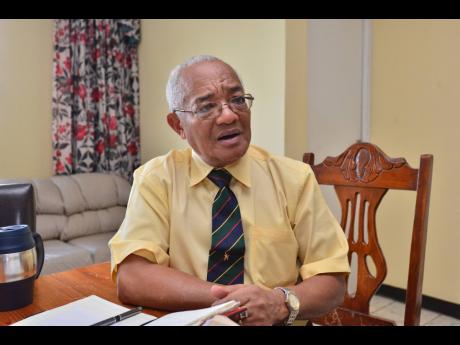A MOM’S AUTOPSY HEARTACHE
Funeral home rejects blame for state of body as cops order DNA test to identify slain son
Sheila Cottrell is a grieving mother with regular high blood pressure readings more than doubling what science deems normal. Her blood pressure skyrocketed when her son, Leroy Brown, aka Dave Roy, from Top Hill in Clarendon, vanished in October....
Sheila Cottrell is a grieving mother with regular high blood pressure readings more than doubling what science deems normal.
Her blood pressure skyrocketed when her son, Leroy Brown, aka Dave Roy, from Top Hill in Clarendon, vanished in October.
After two days missing, the body of the 30-year-old was found on October 21, sending her into shock.
A farmer, Brown was described as industrious, a conversationalist, and mild-mannered.
Residents of the rural community told The Sunday Gleaner that on October 19, a group of men armed with weapons attacked Brown as he tended his farm in May Pen.
According to reports, his body was discovered with multiple stab wounds.
Brown is the second son Cottrell has lost under tragic circumstances. Her eldest son, Nicholas Mendez, died in a motor vehicle accident in 2009 on Rousseau Road in St Andrew.
Now compounding the grief of the distraught mom are hurdles in getting her son’s remains.
Two weekends ago when she went to identify his body for the autopsy, Cottrell said she was asked to provide a DNA sample to make the identification.
“When I get to [the home], the policeman who had my information called me to say that I might never get to see him because he is in a bad state,” Cottrell told The Sunday Gleaner, informing that the body was being stored at the government-contracted Witter & Sons Funeral Home in May Pen, Clarendon, and transported to the Kingston-based House of Tranquillity Funeral Home for the autopsy.
“When I got there, they told me to get a mask because I would be viewing a body. About an hour or two after, the police came back to say I can’t see him because he is in a bad way. So they allowed the police to identify him. Then I was told to go to May Pen Police Station to do a DNA swab to verify that the body identified by the policeman was my son,” the mom said, adding that two other families were also left deflated, unable to view their loved ones’ bodies and also instructed to do DNA tests.
The sample, she said, was taken by a detective at the station.
The grieving mother told The Sunday Gleaner that her son was stripped of his clothes and his hands were tied with the merino he was wearing when he was attacked. The police officer who identified her son reportedly told her that the hands were still tied with the merino.
“What bothers me, and many others, is why they (the police) keep using Witter when they are not storing the bodies properly. This is not the first time it has happened where bodies have deteriorated badly, worse than when they picked them up,” Cottrell said.
Another woman, who lost a sister to violence in 2019, shared similar complaints with The Sunday Gleaner, saying her loved one was also taken to Witter & Sons.
“Her body started to deteriorate because the police had to wait until the Scene of Crime detectives came. Her body was found in the morning about 11:00, but the Scene of Crime personnel did not come until after 5 pm. She was there for [an additional] three hours and it’s after that, that the body was taken,” Lascilda Crosby said Friday.
CLAIM REJECTED
When contacted, Georgia Brightly, the operator of Witter & Sons Funeral Home, rejected assertions that bodies are not properly stored at the facility, which receives all bodies in cases involving the police in Clarendon.
“We receive bodies from the police and they come to us in body bags. We do not touch them until they are to be taken for autopsies. The bodies we get from the police are oftentimes already decomposing. It is those bodies that go to Tranquillity Funeral Home for autopsies,” she told The Sunday Gleaner on Friday. Bodies not part of police matters are taken to another location for autopsies.
Brightly said this was the first time she was hearing such concerns.
“So what are they saying? That it’s Witter & Sons’ fault? No, Ma’am. No. When police cases come here, they stay in the body bags until it’s time for post-mortem. We cannot touch them and we do not do so. I don’t know of any complaints about decomposed bodies,” insisted Brightly, who added that she has not been with the entity for very long.
BODY BAG ISSUE
Calvin Lyn, president of the Jamaica Association of Certified Embalmers and Funeral Directors, told The Sunday Gleaner that while he could not speak to the situations outlined by Cottrell or Crosby, he was aware of problems with operators in the industry. He said many facilities were staffed with untrained personnel.
“I can only speak from experience. If the person was dead for some time before the body was discovered, and having placed it in a body bag to avoid tampering with and loss of evidence, that body in storage for nearly two months will deteriorate. We are not permitted to freeze them, only store [them] at specific temperatures to take care of the bodies. But I know it is difficult for the temperature to penetrate that type of bag,” said the mortician, who has been in the business for nearly half a century.
Lyn said that as contractors, they try as best as possible to retain the bodies in the condition in which they are delivered.
“Lyn’s Funeral Parlour receives police cases for the parish of Manchester. They come in body bags and we cannot touch them,” he said, noting the experience of his own mortuary.
“We use our training, experience, and knowledge and if we have to adjust the temperature on the fridge, we do it to protect the body, depending on the level of decomposition, rather than get a bad name,” said Lyn, noting that his funeral home stores the bodies of victims of road accidents, suicide, drowning, murder and sudden death – all of which involve police investigations.
The Sunday Gleaner was unsuccessful in efforts to get comments from National Security Minister Dr Horace Chang, whose ministry contracts the funeral homes that the police work with.



